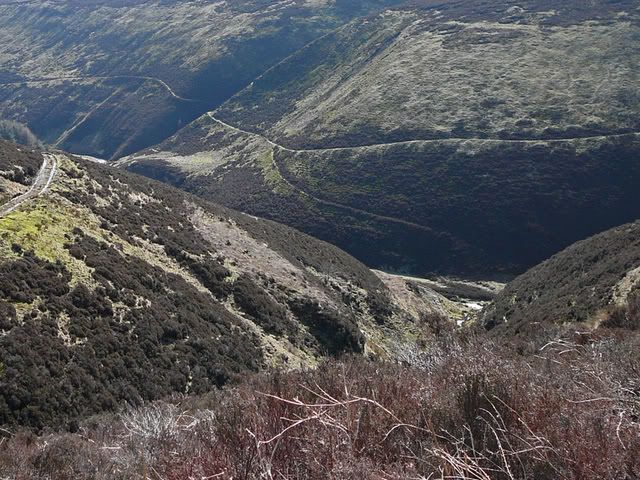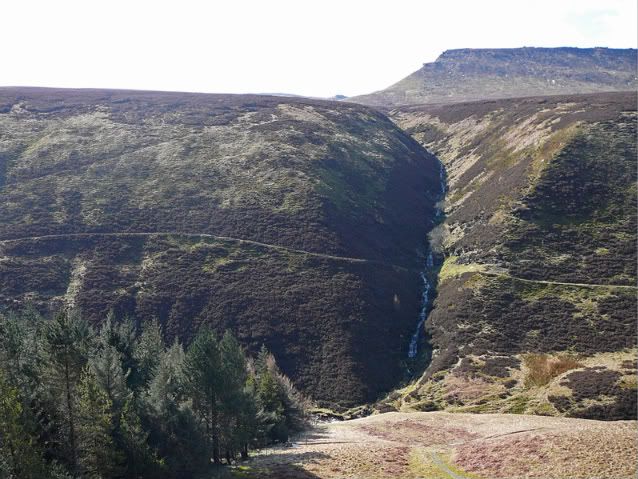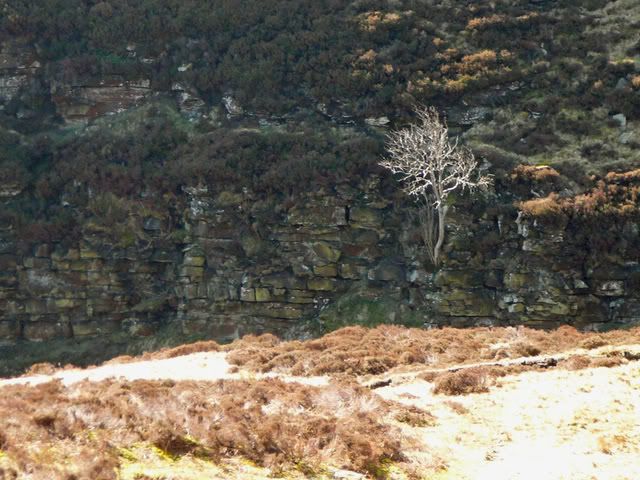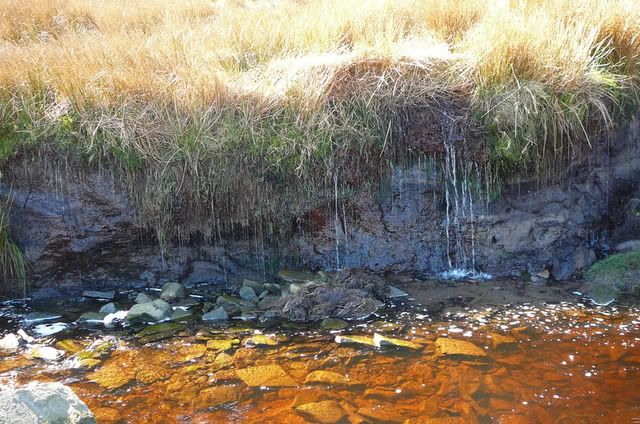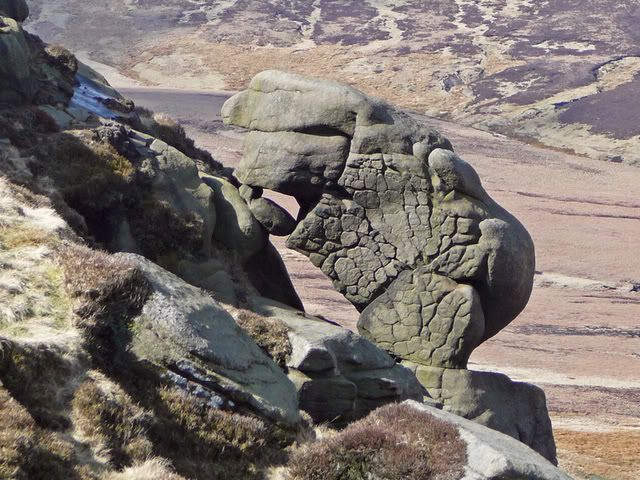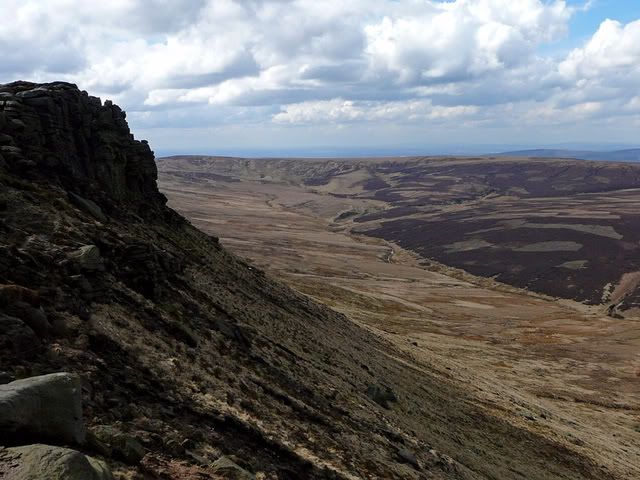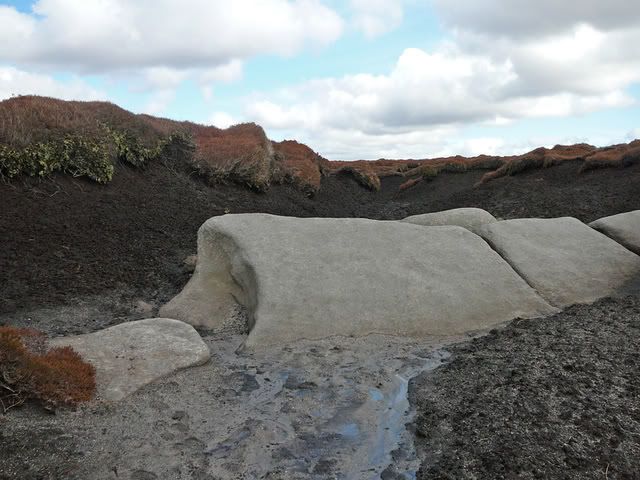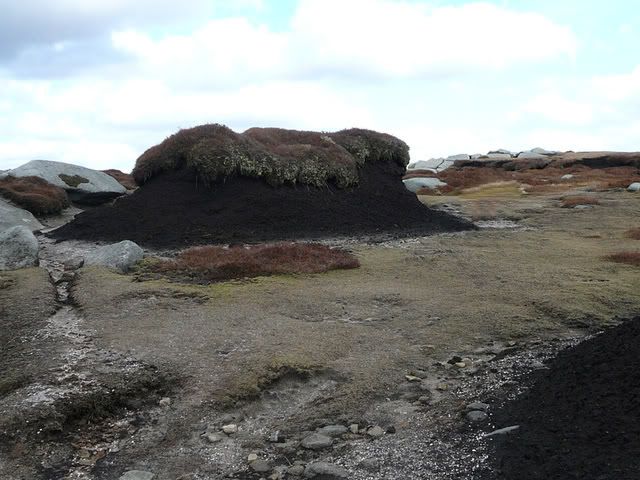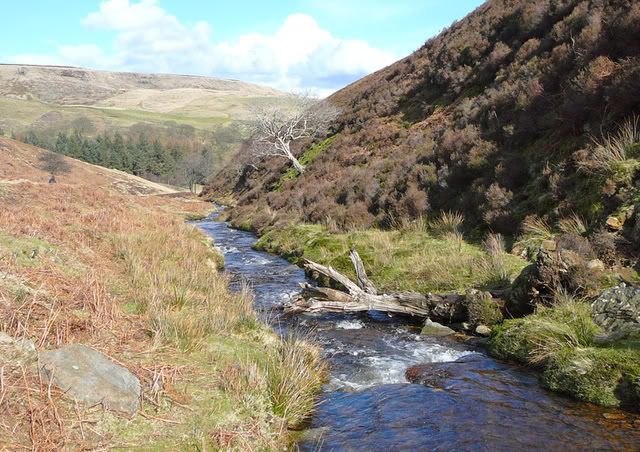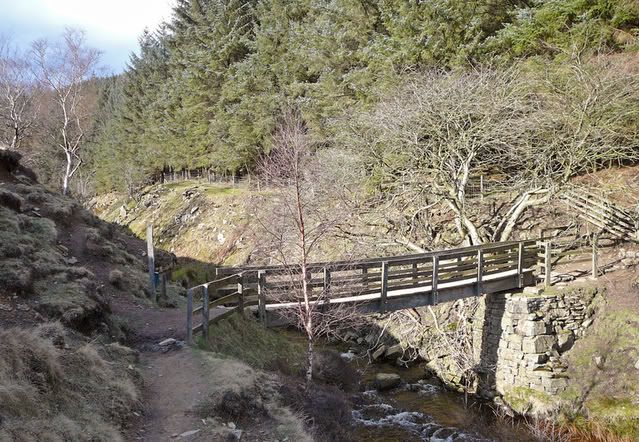Posted: Fri Apr 04, 2008 1:39 pm
A life dedicated to disaster?
OK, a week ago last Thursday at five to one, I abandoned my obligations and my responsibilities, changed into my leathers, signed off from work, and hurtled out the office door. As I hit the street, I thought of Bilbo running off into the wild, unknown landscape of Middle Earth in search of adventure. (Lord of the Rings is my all time fantasy favourite!)
Well, that's what went through my head anyway. (It usually does at moments like this.) In reality, my adventure wasn’t going to be anything like as dramatic as Bilbo's. I was running off to Aston Clinton to pick up the Daytona. And I didn’t exactly run either; I caught a rather smelly number 61 bus from the Galaxy Centre in Luton and sat tight while it trundled its way across country to the dealers. But why be unromantic? It was still an adventure. Anything is an adventure if you view it in the right way.
And from the start it was a slightly complicated adventure. Before catching the 61 I had to ride home to Hitchin from work on the SV then catch a number 100 into Luton. It’s a long time since I‘ve I played the public transport game and I’d forgotten how confusing and infuriating it is if you don’t have an encyclopaedic knowledge of routes and timetables. What's more, I was on a tight schedule. There was one and only one set of interconnecting buses, bike rides and walks that would get me to my destination before the dealers closed. If I messed up on any part of it, that was it! There woudl be no Triumph and no reunion - just a wasted afternoon.
My meeting at work had run on and by the time I left the building I was already late. So when I said I ‘hurtled’ out of the office door, that’s just the simple truth. But I only 'hurtled' the first time I attempted to leave the office. Seconds after I hit the street, I reached into my pocket to pull out my bike keys and realised my wallet wasn't there. My wallet is always there! Always! I won’t describe the very particular feeling that hits the pit of your stomach when you realise something like that. If you’ve lived on this earth for any period of time, you’ll know what I'm talking about.
A dozen possibile options flashed through my mind, but whichever way I looked at it there was a certain remorseless logic to my situation: no wallet - no money - no bus-fare - no bus - no journey - no Triumph. I hurtled back into the office.
The second time I left the building was a far moodier affair. I still hadn't found my wallet. But, I thought, there was just a chance – a small chance - that I had left it at home that morning. I reasoned that if I hung around the office searching for it I would miss my first bus, for sure. If I went back to the house, and it was there, I might still get to the dealers on time. I was aching to sling my leg over the Daytona once again.
But I was far from convinced that I’d left my wallet back in Hitchin. As I rode out of the office courtyard on the SV five minutes later I was already trying to reconcile myself to an afternoon spent cancelling cards, not picking up a bike. I was so preoccupied with these thoughts that I almost didn’t see Angelina running round the corner of the building, shouting and waving her arms at me and carrying a little black square of leather in her hand. Angelina! My angel! My wallet! "fudge"! was I grateful!
During the remainder of the ride home I meditated on how my recent life had become dedicated to brinkmanship and near disaster.
I parked the SV, hoofed it the half mile into town and arrived out of breath at the bus stop to find the bus already there, ready to leave. What a hassle!
There had been no time to change out of my leathers and pack them in my rucksack before leaving home, so the ride into Luton was a hot and sticky one. Fortunately, it was also short and reasonably fast. The number 100 bus travels a good road through some attractive, wide-open countryside. The landscape on either side settled my thoughts. The quiet time on the bus helped me to regather a little presence of mind and restored my enthusiasm for the journey.
But once in Luton, the mistakes of the day continued. I had twenty minutes to get across town to the Aston stop. It wasn’t far, so I didn't hurry. I was determined to remain relaxed. Ten minutes later, though, I was squinting anxiously at a notice attached to the bus shelter. (My glasses were packed in the bottom of my rucksack.) The notice said that from Monday (three days ago) the bus to Aston would depart from stop ‘G3’. Hells bells! I looked at the map – ‘G3’ was almost back where I had just come from. My return trip across town was... shall we say, just a little faster and sweatier. In five minutes I was looking up and down the road where the ‘G3’ stop was supposed to be - only it wasn’t. The stops here all began with a ‘C’ not a ‘G’. (Dammit! I knew I should have got out my glasses.) The ‘G’ stops, I learned from a passer-by, were all down by the Galaxy Centre. I put my trust in his local knowledge and ran like hell.
Have you ever tried running in full motorcycle leathers through crowded streets, with a lid in your hand and a rucksack on your back? It is extremely uncomfortable and moreover looks and feels decidedly naff! I began to wonder if owning a Triumph was always like this. Was this some kind of cosmic loyalty test devised by the company?
The number 61 bus ran out of Luton and into Dunstable past dreary lines of 1930s, Tudor-fronted semis, solidly built but boring as hell. Occasionally, on street corners, there were raised shrubberies that might once have looked attractive on an architect’s drawing board, but had grown rank with neglect now that the contract to maintain them has timed out. We passed metal and plastic industrial units built in the 1990s. Car showrooms and garages with sagging awnings squeezed themselves onto whatever awkward bits of land they could. The showrooms sparkled with chrome; their glass frontages glittered. And all were as false-looking as a car salesman's smile. The industrial units, by contrast, were grimed with the constant emissions from slow-moving cars and lorries. Security guard boxes and barriers at the entrances to factory buildings turned an already ugly, unloved area into a gulag. The bus moved through it all sullenly, stopping and starting, like it was part of some sort of funeral cortege. Visually, the place was a mess – a wasteland. I hate this part of Luton. I hate this kind of development which you see so often on the outskirts of semi-industrial towns.
Inside, the bus was full of depressed-looking shoppers, sitting stiffly beside their bags. As usual at this time of day most of them were women or older folk. Peopled talked, but just briefly and sourly. Women struggled on and off, laden with purchases, accompanied by the huge and anarchic wills of small children.
And to think I used to enjoy travelling by public transport!
But as the bus travelled further out into the countryside and passengers continued to get on and off, the mood inside the bus gradually changed. Most of the occupants were now villagers - country people. They ambled: they didn't hurry. They occupied space comfortably and looked at ease in their seats. They greeted each other and talked quietly among themselves. There were smiles and jokes. The children seemed to be having fun. No-one bothered them too much as they ran up and down the aisle and occasionslly fell sprawling along it.
The bus followed an eccentric route among green meadows and across invisible county boundaries: every few hundred yards we’d pass a sign: Hertfordshire, it would say; Bedfordshire; Buckinghamshire. One moment we were in Herts, the next in Bucks, then Beds, and then, unaccountably, back into Herts again. The bus wiggled its way through the countryside and across the wiggly county boundaries. There was no telling what it would do: one minute we were up on the chalk ridge, the next we were trundling back down the hillside and onto the Bedfordshire plain. We passed though villages, all different from one another as it is possible to imagine, but all with their stout Norman churches and village greens. England is still a land of churches but these days, there are no congregations to fill them. The churches stand alone or side by side with Baptist or Congregationalist chapels, Quaker meeting rooms or Methodist halls - all of which tells you that you are in the historic heartland of English religious dissent.
We passed through small market towns: Totternhoe; Ivinghoe and then through Tring with its lively canal and fantastically pierced 'youth'. Everywhere there were neat country gardens with box hedges, and heaped flower beds. Allotments and cemeteries marked the edges of villages. And beyond and between them all lay miles of magnificent countryside. At times there was wild open grassland to the right of us, merging into heath covered hills. To the left there were small cultivated fields, smallholdings and farms. Then suddenly it would all go into reverse as the bus took a sudden 180 degree turn. This is an ever-changing landscape, full of suprising features, but there is no natural water here: the underlying strata is chalk. Occasionally you see a pumping station and there is the reservoir near Tring, but that is all. The land is lush and green from all the recent rainfall, but there is not a river to be seen.
At three o’clock the villages were suddenly full of mothers waiting outside schools to pick up their little ones. A few minutes later the streets were crowded with small children being accompanied home in tea-cosy hats and berets and beanies and strange looking headgear with piggy ears. Older kids were walking home by themselves: groups of boys, tussling, grabbing at each others jackets; overweight nine and ten year olds with their shirts hanging out; a small group of teenage girls, their chins in the air, smoking ostentatiously, full of attitude and confusion; spindly lads following on behind, horsing around and joking self-consciously. Sod it! It all looked so awkward and painful. I’d hate to be a teenager again!
At Ivinghoe we passed the youth hostel where Di and I stayed on our two-week walk along the Ridgeway to Avebury back in the 1990s – the walk wasn’t particularly arduous but it seemed epic in our imagination. It was a time that brings back intensely happy memories. We passed Ivinghoe Beacon standing out on the line of the chalk hills, marking the route of the fabulous Ridgeway itself – the oldest road in Europe – a commercial highway for at least five thousand years. It’s still a mysterious route to travel along, lined with Neolithic burial mounds and hill carvings, and big, rambling farms that have been settled there since medieval times.
I grew up with an overpowering sense of this landscape, its changing moods and unpredictable weather. I wax very romantic the moment I start thinking about it. It is big and it is varied because, as everywhere in Britain, the underlying geology is insanely complex. At the same time, there can hardly been a landscape more sleepy, more intensely cultivated. It seems wholly benign. And yet, on a stormy day – or when it is just a little wet and windy, even a tame and subdued land like this reverts to its original nature. It becomes huge, potent, singular. It exercises an ancient will.
The land’s will is something you can sense but never describe or understand. It is as hard and as pure as a diamond. It has no need to negotiate its existence. To be in the presence of this will is to know your own essential self. Be attentive to it, and you can hear the endless shifting movement of your own fear, your own courage - and your own insignificance. To know the original nature of the land is to be granted a space in which you can truly live as a human being.
I don’t think I could have survived sanely without a regular connection with this land. For six months back in the nineteen seventies I had a flat in central London and went almost mad with frustration and stress. Every night I had bad dreams. I dreamt I was climbing over endless concrete walls trying to find the one green field that lay beyond all this urban grime and ugliness. It was in those six months that I learned that I wasn’t the person I wanted to be. For the first time I understood there was a place where I belonged. Being in this open landscape settles and grounds me. It absorbs my distress and leaves me full of joy and happiness.
To know the nature of this land is to find your own heart. But, as I’ve come to understand in recent years, you can only find true peace when you know that you are prepared to die. That was something Di taught me. It's the sacrifice demanded by life and the challenge it poses.
If you are lucky you will hear the land speak. When the land speaks, it speaks with a single voice. You hear it in the drench of the rain or in the soft silence of snow; you hear it sometimes in the intense heat of mid-summer, when it speaks through a million living things; but most of all you can hear it when the wind howls around the hillsides, shaking the trees.
When you hear the land’s voice, it is special. The experience is personal and belongs to the time of your hearing. For me it is something like a single, deep organ chord. I heard it first when I was a child lying in bed, listening to the sound of the wind whistling round the corners of the house. I remember it clearly. It was like an undertone that reverberated in the earth and the trees and up through my own physical body. It reverberated in my mind too: a sound, but not a sound.
Too much imagination, my mother always said!
The voice of the land is a metaphor and also a reality. It stands for the unmediated moment. It is a moment when the world is not grasped through thought or intention or will; it is not grasped at by fear or sought by longing; it just is. It is a moment of direct experience. It happens rarely, but when it comes it is well worth waiting for.
The Daytona was well worth waiting for too.
But it gave me a moment of regret. Over the previous fortnight I’d been growing fond of the SV again. It has started to feel like an old warhorse. I love its grunt and ballsy low-down energy. But all those extra ponies in the Daytona are very seductive. And I love the bulk of her and the way she handles. Someone once said to me that riding a motorcycle is the nearest thing on earth to flying. Well, for me, when riding the Daytona, that is no more than the literal truth. She soars. She’s not an ‘exciting’ bike. She’s not nervous or twitchy or unpredictable. – she doesn’t have ‘character’ as the motorcycle magazines like to call it, but she flies like a bird. I love her to bits.
I rode her home back through Hemel on the A41. It’s not the most interesting of routes, but its one where any bike can find its wings. And what wings she has. Bilbo never had an adventure like this.
I suspect the SV is going to start feeling neglected again for a while.
Postscript. Oh yes! The dealers didn’t charge me a penny for checking the Daytona over, despite the fact that they had spent a couple of hours on her - and that included taking her for a test ride to see how the engine was performing. I suspect they know that they’ve got a regular customer here. They clearly know how to keep their customers happy, and that’s fine by me.
So with the Daytona swooping round corners beneath me and my bank balance healthier by some margin than I’d expected I started to think that life is not wholly dedicated to disaster after all.
OK, a week ago last Thursday at five to one, I abandoned my obligations and my responsibilities, changed into my leathers, signed off from work, and hurtled out the office door. As I hit the street, I thought of Bilbo running off into the wild, unknown landscape of Middle Earth in search of adventure. (Lord of the Rings is my all time fantasy favourite!)
Well, that's what went through my head anyway. (It usually does at moments like this.) In reality, my adventure wasn’t going to be anything like as dramatic as Bilbo's. I was running off to Aston Clinton to pick up the Daytona. And I didn’t exactly run either; I caught a rather smelly number 61 bus from the Galaxy Centre in Luton and sat tight while it trundled its way across country to the dealers. But why be unromantic? It was still an adventure. Anything is an adventure if you view it in the right way.
And from the start it was a slightly complicated adventure. Before catching the 61 I had to ride home to Hitchin from work on the SV then catch a number 100 into Luton. It’s a long time since I‘ve I played the public transport game and I’d forgotten how confusing and infuriating it is if you don’t have an encyclopaedic knowledge of routes and timetables. What's more, I was on a tight schedule. There was one and only one set of interconnecting buses, bike rides and walks that would get me to my destination before the dealers closed. If I messed up on any part of it, that was it! There woudl be no Triumph and no reunion - just a wasted afternoon.
My meeting at work had run on and by the time I left the building I was already late. So when I said I ‘hurtled’ out of the office door, that’s just the simple truth. But I only 'hurtled' the first time I attempted to leave the office. Seconds after I hit the street, I reached into my pocket to pull out my bike keys and realised my wallet wasn't there. My wallet is always there! Always! I won’t describe the very particular feeling that hits the pit of your stomach when you realise something like that. If you’ve lived on this earth for any period of time, you’ll know what I'm talking about.
A dozen possibile options flashed through my mind, but whichever way I looked at it there was a certain remorseless logic to my situation: no wallet - no money - no bus-fare - no bus - no journey - no Triumph. I hurtled back into the office.
The second time I left the building was a far moodier affair. I still hadn't found my wallet. But, I thought, there was just a chance – a small chance - that I had left it at home that morning. I reasoned that if I hung around the office searching for it I would miss my first bus, for sure. If I went back to the house, and it was there, I might still get to the dealers on time. I was aching to sling my leg over the Daytona once again.
But I was far from convinced that I’d left my wallet back in Hitchin. As I rode out of the office courtyard on the SV five minutes later I was already trying to reconcile myself to an afternoon spent cancelling cards, not picking up a bike. I was so preoccupied with these thoughts that I almost didn’t see Angelina running round the corner of the building, shouting and waving her arms at me and carrying a little black square of leather in her hand. Angelina! My angel! My wallet! "fudge"! was I grateful!
During the remainder of the ride home I meditated on how my recent life had become dedicated to brinkmanship and near disaster.
I parked the SV, hoofed it the half mile into town and arrived out of breath at the bus stop to find the bus already there, ready to leave. What a hassle!
There had been no time to change out of my leathers and pack them in my rucksack before leaving home, so the ride into Luton was a hot and sticky one. Fortunately, it was also short and reasonably fast. The number 100 bus travels a good road through some attractive, wide-open countryside. The landscape on either side settled my thoughts. The quiet time on the bus helped me to regather a little presence of mind and restored my enthusiasm for the journey.
But once in Luton, the mistakes of the day continued. I had twenty minutes to get across town to the Aston stop. It wasn’t far, so I didn't hurry. I was determined to remain relaxed. Ten minutes later, though, I was squinting anxiously at a notice attached to the bus shelter. (My glasses were packed in the bottom of my rucksack.) The notice said that from Monday (three days ago) the bus to Aston would depart from stop ‘G3’. Hells bells! I looked at the map – ‘G3’ was almost back where I had just come from. My return trip across town was... shall we say, just a little faster and sweatier. In five minutes I was looking up and down the road where the ‘G3’ stop was supposed to be - only it wasn’t. The stops here all began with a ‘C’ not a ‘G’. (Dammit! I knew I should have got out my glasses.) The ‘G’ stops, I learned from a passer-by, were all down by the Galaxy Centre. I put my trust in his local knowledge and ran like hell.
Have you ever tried running in full motorcycle leathers through crowded streets, with a lid in your hand and a rucksack on your back? It is extremely uncomfortable and moreover looks and feels decidedly naff! I began to wonder if owning a Triumph was always like this. Was this some kind of cosmic loyalty test devised by the company?
The number 61 bus ran out of Luton and into Dunstable past dreary lines of 1930s, Tudor-fronted semis, solidly built but boring as hell. Occasionally, on street corners, there were raised shrubberies that might once have looked attractive on an architect’s drawing board, but had grown rank with neglect now that the contract to maintain them has timed out. We passed metal and plastic industrial units built in the 1990s. Car showrooms and garages with sagging awnings squeezed themselves onto whatever awkward bits of land they could. The showrooms sparkled with chrome; their glass frontages glittered. And all were as false-looking as a car salesman's smile. The industrial units, by contrast, were grimed with the constant emissions from slow-moving cars and lorries. Security guard boxes and barriers at the entrances to factory buildings turned an already ugly, unloved area into a gulag. The bus moved through it all sullenly, stopping and starting, like it was part of some sort of funeral cortege. Visually, the place was a mess – a wasteland. I hate this part of Luton. I hate this kind of development which you see so often on the outskirts of semi-industrial towns.
Inside, the bus was full of depressed-looking shoppers, sitting stiffly beside their bags. As usual at this time of day most of them were women or older folk. Peopled talked, but just briefly and sourly. Women struggled on and off, laden with purchases, accompanied by the huge and anarchic wills of small children.
And to think I used to enjoy travelling by public transport!
But as the bus travelled further out into the countryside and passengers continued to get on and off, the mood inside the bus gradually changed. Most of the occupants were now villagers - country people. They ambled: they didn't hurry. They occupied space comfortably and looked at ease in their seats. They greeted each other and talked quietly among themselves. There were smiles and jokes. The children seemed to be having fun. No-one bothered them too much as they ran up and down the aisle and occasionslly fell sprawling along it.
The bus followed an eccentric route among green meadows and across invisible county boundaries: every few hundred yards we’d pass a sign: Hertfordshire, it would say; Bedfordshire; Buckinghamshire. One moment we were in Herts, the next in Bucks, then Beds, and then, unaccountably, back into Herts again. The bus wiggled its way through the countryside and across the wiggly county boundaries. There was no telling what it would do: one minute we were up on the chalk ridge, the next we were trundling back down the hillside and onto the Bedfordshire plain. We passed though villages, all different from one another as it is possible to imagine, but all with their stout Norman churches and village greens. England is still a land of churches but these days, there are no congregations to fill them. The churches stand alone or side by side with Baptist or Congregationalist chapels, Quaker meeting rooms or Methodist halls - all of which tells you that you are in the historic heartland of English religious dissent.
We passed through small market towns: Totternhoe; Ivinghoe and then through Tring with its lively canal and fantastically pierced 'youth'. Everywhere there were neat country gardens with box hedges, and heaped flower beds. Allotments and cemeteries marked the edges of villages. And beyond and between them all lay miles of magnificent countryside. At times there was wild open grassland to the right of us, merging into heath covered hills. To the left there were small cultivated fields, smallholdings and farms. Then suddenly it would all go into reverse as the bus took a sudden 180 degree turn. This is an ever-changing landscape, full of suprising features, but there is no natural water here: the underlying strata is chalk. Occasionally you see a pumping station and there is the reservoir near Tring, but that is all. The land is lush and green from all the recent rainfall, but there is not a river to be seen.
At three o’clock the villages were suddenly full of mothers waiting outside schools to pick up their little ones. A few minutes later the streets were crowded with small children being accompanied home in tea-cosy hats and berets and beanies and strange looking headgear with piggy ears. Older kids were walking home by themselves: groups of boys, tussling, grabbing at each others jackets; overweight nine and ten year olds with their shirts hanging out; a small group of teenage girls, their chins in the air, smoking ostentatiously, full of attitude and confusion; spindly lads following on behind, horsing around and joking self-consciously. Sod it! It all looked so awkward and painful. I’d hate to be a teenager again!
At Ivinghoe we passed the youth hostel where Di and I stayed on our two-week walk along the Ridgeway to Avebury back in the 1990s – the walk wasn’t particularly arduous but it seemed epic in our imagination. It was a time that brings back intensely happy memories. We passed Ivinghoe Beacon standing out on the line of the chalk hills, marking the route of the fabulous Ridgeway itself – the oldest road in Europe – a commercial highway for at least five thousand years. It’s still a mysterious route to travel along, lined with Neolithic burial mounds and hill carvings, and big, rambling farms that have been settled there since medieval times.
I grew up with an overpowering sense of this landscape, its changing moods and unpredictable weather. I wax very romantic the moment I start thinking about it. It is big and it is varied because, as everywhere in Britain, the underlying geology is insanely complex. At the same time, there can hardly been a landscape more sleepy, more intensely cultivated. It seems wholly benign. And yet, on a stormy day – or when it is just a little wet and windy, even a tame and subdued land like this reverts to its original nature. It becomes huge, potent, singular. It exercises an ancient will.
The land’s will is something you can sense but never describe or understand. It is as hard and as pure as a diamond. It has no need to negotiate its existence. To be in the presence of this will is to know your own essential self. Be attentive to it, and you can hear the endless shifting movement of your own fear, your own courage - and your own insignificance. To know the original nature of the land is to be granted a space in which you can truly live as a human being.
I don’t think I could have survived sanely without a regular connection with this land. For six months back in the nineteen seventies I had a flat in central London and went almost mad with frustration and stress. Every night I had bad dreams. I dreamt I was climbing over endless concrete walls trying to find the one green field that lay beyond all this urban grime and ugliness. It was in those six months that I learned that I wasn’t the person I wanted to be. For the first time I understood there was a place where I belonged. Being in this open landscape settles and grounds me. It absorbs my distress and leaves me full of joy and happiness.
To know the nature of this land is to find your own heart. But, as I’ve come to understand in recent years, you can only find true peace when you know that you are prepared to die. That was something Di taught me. It's the sacrifice demanded by life and the challenge it poses.
If you are lucky you will hear the land speak. When the land speaks, it speaks with a single voice. You hear it in the drench of the rain or in the soft silence of snow; you hear it sometimes in the intense heat of mid-summer, when it speaks through a million living things; but most of all you can hear it when the wind howls around the hillsides, shaking the trees.
When you hear the land’s voice, it is special. The experience is personal and belongs to the time of your hearing. For me it is something like a single, deep organ chord. I heard it first when I was a child lying in bed, listening to the sound of the wind whistling round the corners of the house. I remember it clearly. It was like an undertone that reverberated in the earth and the trees and up through my own physical body. It reverberated in my mind too: a sound, but not a sound.
Too much imagination, my mother always said!
The voice of the land is a metaphor and also a reality. It stands for the unmediated moment. It is a moment when the world is not grasped through thought or intention or will; it is not grasped at by fear or sought by longing; it just is. It is a moment of direct experience. It happens rarely, but when it comes it is well worth waiting for.
The Daytona was well worth waiting for too.
But it gave me a moment of regret. Over the previous fortnight I’d been growing fond of the SV again. It has started to feel like an old warhorse. I love its grunt and ballsy low-down energy. But all those extra ponies in the Daytona are very seductive. And I love the bulk of her and the way she handles. Someone once said to me that riding a motorcycle is the nearest thing on earth to flying. Well, for me, when riding the Daytona, that is no more than the literal truth. She soars. She’s not an ‘exciting’ bike. She’s not nervous or twitchy or unpredictable. – she doesn’t have ‘character’ as the motorcycle magazines like to call it, but she flies like a bird. I love her to bits.
I rode her home back through Hemel on the A41. It’s not the most interesting of routes, but its one where any bike can find its wings. And what wings she has. Bilbo never had an adventure like this.
I suspect the SV is going to start feeling neglected again for a while.
Postscript. Oh yes! The dealers didn’t charge me a penny for checking the Daytona over, despite the fact that they had spent a couple of hours on her - and that included taking her for a test ride to see how the engine was performing. I suspect they know that they’ve got a regular customer here. They clearly know how to keep their customers happy, and that’s fine by me.
So with the Daytona swooping round corners beneath me and my bank balance healthier by some margin than I’d expected I started to think that life is not wholly dedicated to disaster after all.
